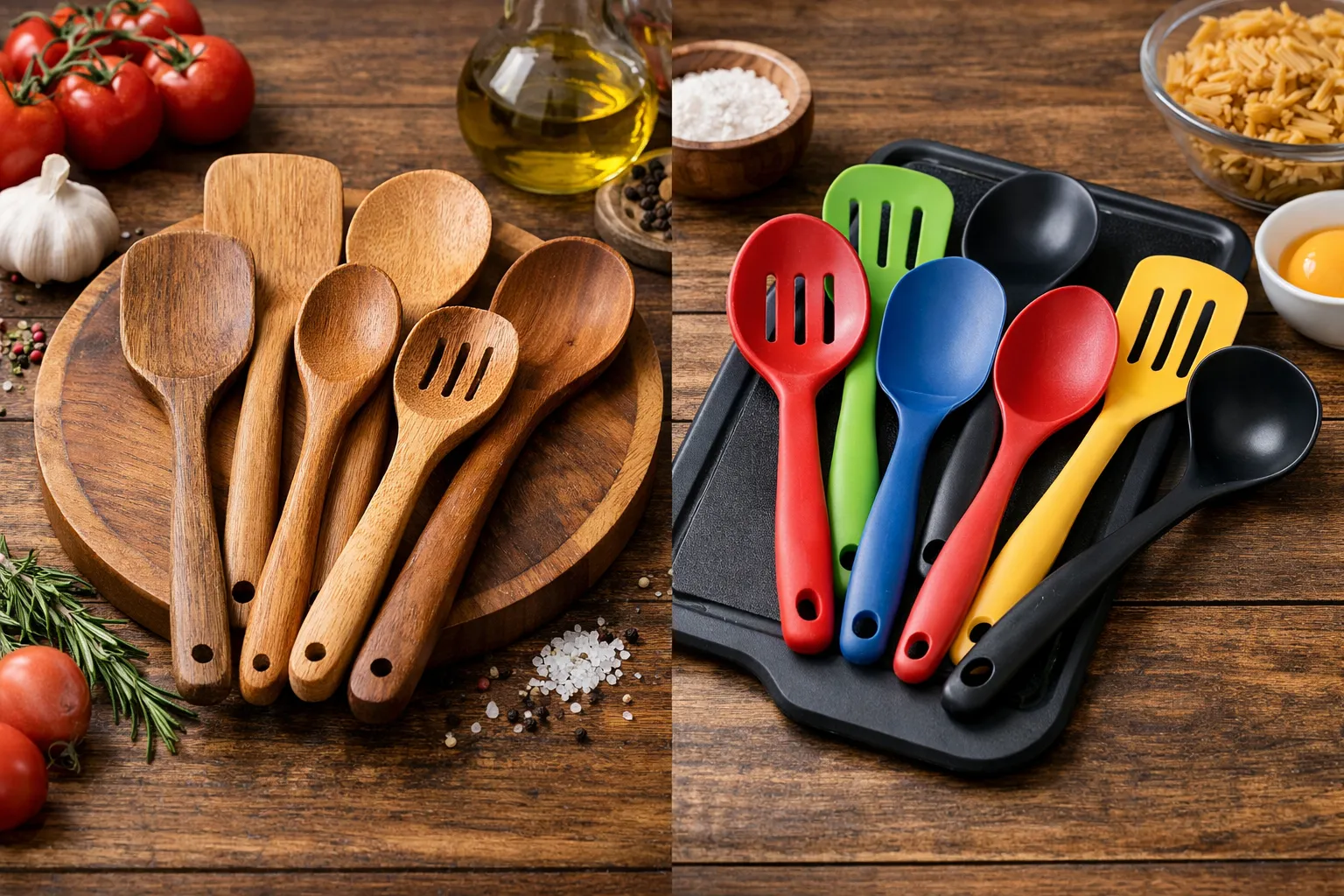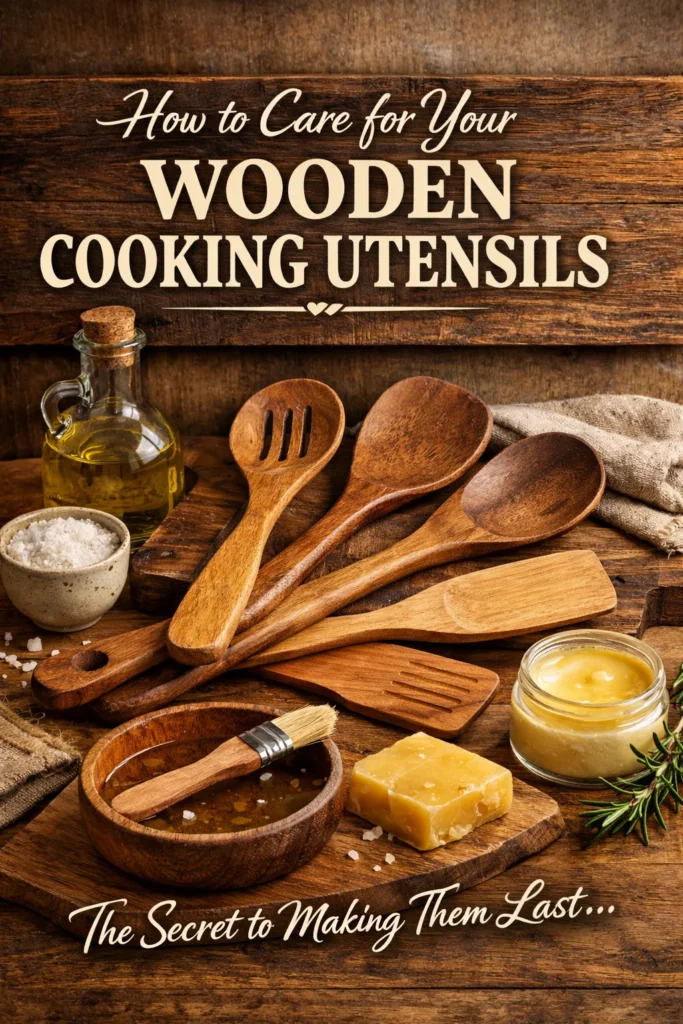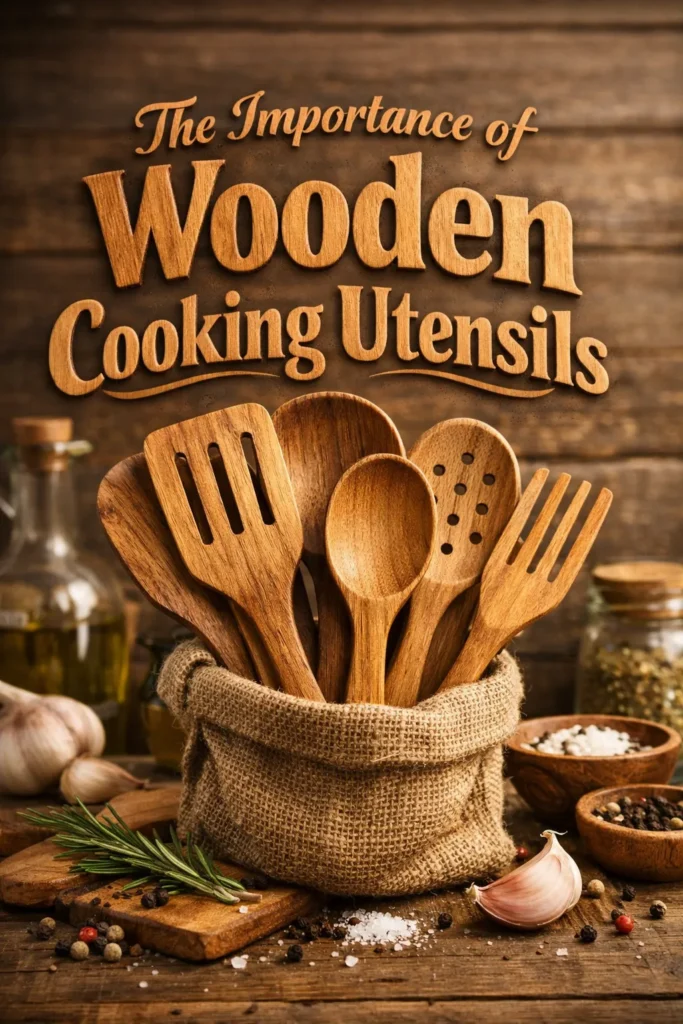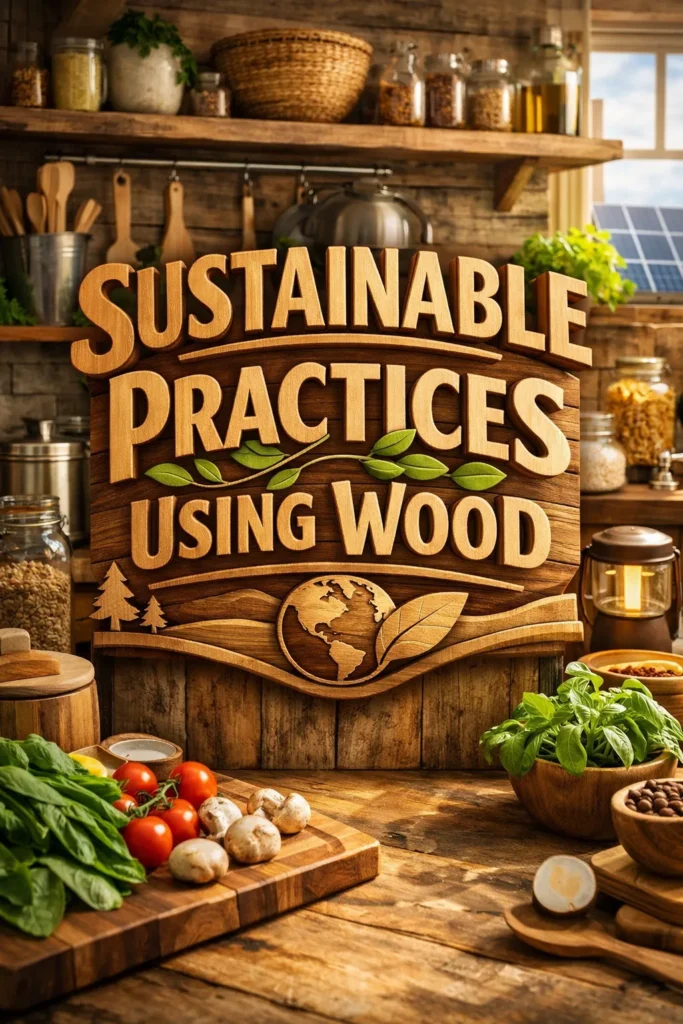The equipment you use to cook can have a profound influence over your experience, and the end product. Wooden cooking utensils have several advantages, especially over the plastic ones. In this article, we discuss the advantages of adding wooden utensils to the kitchen.
Durability and Longevity
A wooden cooking utensil can last very long due to its exceptional durability. Whereas plastic can warp, crack or degrade over time, wood is a durable material that can last for decades when cared for properly. Here’s why durability matters:
Affordability – Wooden utensils will save your money in the long run.
Less Waste: With lower replacements you contribute less to the landfills.
Health and Safety
Wellness is the utmost priority when choosing cooking utensils. Wooden utensils are safer than plastic, which can leach toxic chemicals into food. In particular many wooden alternatives are crafted from butcher block natural woods that won’t harbor bacteria if well cared for.
Non-Toxic: Avoids leaching harmful chemicals into your food.
Antibacterial Properties: Wood has tannins, which emit chemical compounds that can help prevent bacterial growth.
Heat Resistance
Wooden utensils have another very great characteristic to them — heat resistance. They do not heat up while plastic does, so there’s less risk of burns during cooking. They are, therefore, perfect for stirring hot pots or scraping edges where plastic could melt. Some of the benefits include:
Handles Safe: Unlike plastic, you can use wooden utensils on hot dishes without the threat of melting or warping.
Easier to Hold: Smooth plastic surfaces aren’t the most comfortable surfaces to hold.
Aesthetic Appeal
Wooden utensils give your kitchen a warm rustic feel. The natural grain patterns and colors in wood can significantly enhance the overall appearance of your kitchenware. This aesthetic quality isn’t merely decorative; it makes cooking more pleasurable. Here are some things to keep in mind:
Visual Cohesion: Wood works with the rest of your cookware and kitchen.
Unique Designs: Every wooden utensil is different and no two are exactly the same.
Environmental Impact
Wooden cooking utensils over plastic ones is eco-friendly. Wood is also a renewable resource, particularly when harvested from sustainably managed forests. Here’s why that is good for the environment:
Biodegradable: Wooden cutlery can decompose naturally at the end of its life span.
Carbon Footprint: Plastic manufacturing and disposal adversely affect the environment more than wood.
Maintenance and Care
Caring for wooden cooking utensils is one of the simplest forms of maintaining kitchen tools. Here are a few straightforward tips for keeping them well:
| Care Tip | Description |
|---|---|
| Hand Wash | Avoid dishwashing; instead, wash wooden utensils by hand with warm soapy water to preserve their integrity. |
| Oil Regularly | Apply food-safe mineral oil every few months to prevent the wood from drying out and cracking. |
| Dry Promptly | After washing, dry your wooden utensils promptly to prevent warping or water damage. |
| Benefits Over Plastic | Wooden utensils are safer, more aesthetic, and better for the environment compared to plastic ones. |
| Healthier and Enjoyable Cooking | Wood provides a healthier, more enjoyable cooking experience, offering both functionality and charm. |
Not only do wooden utensils elevate your cooking experience but they also benefit the environment. Switch over today, and you’ll probably feel the quality difference in both your food and kitchen vibe.
How to Care for Your Wooden Cooking Utensils: The Secret to Making Them Last
Wooden Cooking Utensils
Wooden cooking utensils are a treasure in every kitchen. They can take your cooking experience to the next level with their natural beauty and long-lasting reliability. But, like all things, they require proper care to last for years. Below, we offer some advice on how to preserve your wooden utensils and get the most use out of them.
The Importance of Wooden Cooking Utensils
Now let us discuss care tips, but first it is necessary to understand the reason why cooking utensils made of wood are a popular preference. Here are some benefits:
| Feature | Description |
|---|---|
| Gentler on Cookware | Wooden utensils won’t scratch your pots and pans, making them ideal for non-stick cookware. |
| Heat Resistance | More heat-resistant than plastic, reducing the risk of melting when used in high-temperature cooking. |
| Natural Aesthetic | Wooden utensils add a charming, rustic feel to your kitchen. |
| Durable and Long-lasting | With proper care, wooden utensils can last a lifetime, offering long-term functionality. |
Cleaning Your Wooden Utensils
| Cleaning Tip | Description |
|---|---|
| Hand Wash Only | Never put wooden utensils in the dishwasher; heat and water can warp or split the wood. |
| Mild Soap | Use gentle dish soap with a soft sponge to clean without damaging the surface. |
| Rinse | Rinse under warm water to remove any soap residue. |
| No Soaking | Avoid soaking in water, as this can cause the wood to swell and crack. |
Drying Techniques for Wooden Utensils
| Drying Tip | Description |
|---|---|
| Pat Dry | Wipe the utensils with a clean cloth to remove excess water. |
| Air Dry | Lay or stand utensils in a ventilated area to dry completely. Avoid direct sunlight to prevent cracking. |
Conditioning Wooden Cooking Utensils
| Conditioning Tip | Description |
|---|---|
| Stabilize with Oil | Use food-safe mineral oil or coconut oil to condition. Avoid vegetable oils and rancid fats. |
| Apply Oil Sparingly | Rub in oil thinly using a soft cloth, let sit for at least 30 minutes, and wipe off excess. |
| Frequency | Condition every couple of weeks or monthly, depending on usage. |
Storing Your Wooden Utensils
| Storage Tip | Description |
|---|---|
| Upright Storage | Store utensils upright in a holder to minimize scratching and allow air circulation. |
| Avoid Damp Areas | Do not store in humid areas, as moisture can cause deterioration and mold. |
| Group Like Utensils | Keep similar utensils together to avoid damage from banging against each other. |
Avoiding Common Mistakes
Unfortunately stated, most of us unknowingly ruin our wooden cooking utensils by adopting wrong practices. Avoid these common errors:
| Care Tip | Description |
|---|
| Using in the Dishwasher | Never put wooden utensils in the dishwasher, as the heat and water can damage the wood. |
| For High-Heat Cooking | Wooden utensils are heat-resistant, but avoid exposing them to extremely high temperatures for long periods. |
| Ignoring Repairs | Address any cracks or wear promptly to prevent further damage and preserve the utensil’s integrity. |
Sustainable Practices Using Wood, Eco-Friendly Kitchen
Wooden Cooking Utensils
Today many individuals are interested in an eco-friendly kitchen. Arguably the easiest and largest contributor to sustainable cooking habits, when you choose wooden cooking utensils. Functional utensils that have minimal impact on the environment. So lets dive in to see how they are good for sustainability and why you should be keeping them stocked in your kitchen.
Wooden cooking utensils are made of natural materials and also biodegradable. Wooden options can go back to earth without harming nature, unlike plastic utensils that can take tons of years to decompose. Wooden utensils can also be made from trees farmed in managed forests. By using utensils from companies committed to sustainability, you’re supporting good forestry practices that keep our planet safe.
Let us look at the significant advantages of using wooden cooking tools:
Sustainable Source: Wood is a sustainable source when managed properly. This, which over time can prevent forests even being harvested for material at all.»
Durability — Wooden utensils are sturdy and can last for years if you care for them with proper usage. This also means that not as many replacements are needed thus reducing waste.
No Toxic Chemicals: Many wooden utensils are made without harmful chemicals. This is what makes them a safer alternative for your family and the environment.
Unique Aesthetic: Every piece of wooden kitchenware has its own unique patterns and hues. The natural beauty adds warmth to your kitchen and dining experience.
If you are looking for wooden cooking utensils, make sure it is hardwoods like bamboo, maple or beech. Bamboo, especially, is recognized for its swift growth and provides a great renewable resource that does not endanger forest ecosystems. Such materials are sustainable sources, and using them helps create demand for such sources.
Just as properly washing your wooden utensils is important for their longevity, so is taking care of them. Wash them regularly with warm water and mild soap, being careful not to soak them in order to avoid warping. A light application of mineral oil from time to time will keep them looking their best, and help extend their life. Not only does this simple piece of advice help maintain the quality and care for your utensils, but it also reduces the need for frequent replacements, thereby supporting sustainable practices.
In addition to that, wooden cooking utensils do promote healthier cooking. They’re forgiving of your cookware surfaces, particularly non-stick pans, reducing scratching and extending the life of your kitchen equipment. They are also non-absorbent, which means they don’t pick up flavor or smell of the food like some other cookware can.
Wood utensils have all the above benefit with very few if any negatives. When cooking comes together with the visceral sensation of wood, it links one more closely to the food and adds to the ceremony of making a meal. I know many chefs who love the sensory nature of working with wood, its warm hand feel and tactile surface.
As you create or expand your eco-friendly kitchen, here’s what you may want to add. Here is a quick list of wood utensils to consider for your sustainable culinary toolkit:
Products not fetched from DB and/or API. Please check debug logs. Products not fetched from DB and/or API. Please check debug logs. Products not fetched from DB and/or API. Please check debug logs.Wooden spoons: Great for stirring, mixing and serving.
| Wooden Utensil | Description |
|---|---|
| Wooden Spatulas | Slotted and solid spatulas are perfect for flipping and sautéing without damaging your cookware. |
| Wooden Tongs | Ideal for safely grabbing hot foods, making them a great tool for handling cooked dishes. |
| Wooden Cutting Boards | A must-have accessory for food prep, complementing your utensils and providing a durable surface. |
Busted: Common Myths About Wooden Cooking Utensils
Many home chefs and even professional cooks swear by wooden cooking utensils. Yet there are a number of myths about their use that can cause confusion and misinformation. Take a look at these popular misconceptions so that you can understand why wooden utensils are quite the top players in your kitchen.
MYTH 1: Wood Utensils Absorb Bacteria
One of the most common beliefs is that wooden cooking tools are a breeding ground for bacteria. However, research has indicated that wood possesses intrinsic antimicrobial properties. Wood has a natural structure that actively hinders growing of harmful bacteria. Actually, wooden utensils may be more hygienic because they don’t have the pores that trap germs, as do some plastic peers.
Myth 2: Wooden Utensils Are Difficult to Care for
Some cooks avoid wooden utensils, believing they are hard to maintain. The fact is, wooden utensils are easy to care for:
| Care Tip | Description |
|---|
| Hand Wash | Wash wooden utensils with warm, soapy water, but avoid soaking them for long periods. |
| Wash and Dry Immediately | After washing, wipe them down and allow them to air dry to prevent moisture damage. |
| Mineral Oil Application | Apply mineral oil periodically to moisturize the wood and extend the life of your utensils. |
MYTH 3: Wooden Utensils Can’t Take Heat
It wrongly suggests that wooden cooking utensils cannot resist high temperatures. It’s true that they shouldn’t sit over a flame or in a hot oven, but generally speaking they’re safe with hot food. They can withstand the temperatures of normal cooking without melting or warping, and can be used for various activities ranging from stirring soups to sautéing vegetables.
The Myth: Wooden Utensils Will Transfer Taste to Food
Another myth is that wooden utensils absorb flavor or alter the taste of your food. Some wooden kitchen items, like those you might stir in sauces or marinated dishes, are probably crated this way. But the truth is, they add no flavor to your food as long as they are cleaned properly. Metal utensils can sometimes react to acidic foods, while wooden utensils remain neutral – so your dishes can taste like they are supposed to.
Myth 5: All Wooden Utensils Come From Unsustainable Sources
Many people think that wooden utensils are not eco-friendly because of the environmental effects. However, many manufacturers use wood from sustainable forests. Seek for items certified by such organizations as the FSC (Forest Stewardship Council). This means the timber in your utensils comes from responsible managed sources and helps promote sustainability.
Myth 6: Wooden Utensils Are Only for Fancy Cooks
Using wooden utensils can be thought of as just for gourmet chefs or people making fancy meals. Wooden utensils are, in fact, practical for any kitchen—with either an inexperienced chef or a seasoned professional at the helm. They are also multifunction tools that can mix, flip and serve a wide range of specific products. An ergonomic shape makes them easier to use, and their natural appeal can add beauty to your kitchen.
Myth 7: Wooden Utensils Are Pricier Than Other Utensils
While I think wooden cooking utensils are expensive compared to plastic or metal ones. That said, wooden utensils can end up being more cost-effective in the long haul with durability and longevity considered. Quality wooden utensils often last longer than plastic, so they’ll save you money over time. Plus, the beauty and warmth of wood can enhance your kitchen experience.
Why Choose Wooden Cooking Utensils?
With all of the myths debunked, here were some of the benefits to wooden cooking utensils:
Data through October 2023BenefitsDescriptionDurabilityLong-lasting and resistant to wear. High Food SafetyWaterproof, anticorrosive and antibacterial force. Neutral TasteWill not alter the flavor of your cooking. Eco-Friendly ChoicesMost are harvested from sustainable forests. AestheticIt adds warmth and beauty to your kitchen.
Don’t let these common myths get in the way of your cooking, with wooden cooking utensils being there to improve it. Not only do they keep your kitchen functioning but with less waste, they can actually help create a healthier environment. Rounding out your utensils to include higher quality wooden options should be one of the next additions you make! Learn more about wooden cooking utensils and their advantages at Woodworkers Source.
Wooden Utensils: 9 Uses Beyond Cooking
Wooden Cooking Utensils
Wooden cooking utensils are known as essential kitchen tools, but the possibilities of these utensils extend into more than just the stovetop. With a little creativity, these lovely and useful items can take on new lives in your home and life. Here, the creative geniuses at Well staff pitch their unexpected uses of wood utensils.
Decorative Displays
Wooden utensils can double as beautiful decor. Try adding a grouping of wooden spoons or spatulas in a glass jar, or decorative bowl on your kitchen counter. This not only gives your kitchen a rustic touch but also store your utensils within reach. You can even paint or stain the wood to match your home’s decor, adding a personal touch.
| Creative Use | Description |
|---|
| Art Projects | Wooden utensils can be transformed into art pieces, adding a unique touch to your space. |
| Colorful Utensil Rack | Showcase several painted wooden spoons on a wooden board to create a vibrant, eye-catching wall display. |
| Twine Designs | Use twine to create fun designs with your wooden utensils, turning them into an artistic installation. |
| Upcycled Spoon Wall Art | Paint spoons in bright colors and arrange them into a decorative wall pattern for a playful, artistic touch. |
| DIY Gifts | Wooden utensils can be turned into personalized, handmade gifts, perfect for any occasion. |
Wooden utensils are a thoughtful, homemade gift. You can personalize them by carving names or special messages into the wood, or decorate them with paint. Pair a hand-made wooden spoon with your favorite cookie recipe, or make gift baskets themed around other kitchen essentials. These gifts have the personal touch and show your efforts and creativity.
Garden Markers
If you like to garden, wooden utensils can be used as practical plant markers. Just write your plants’ names on a wooden spoon with a permanent marker. You can then place the spoon in the ground next to each plant. However, not only is this a pretty way to label your garden, but keeps your gardening equipment green.
Table Centerpieces
Making a wooden utensils to be unique on the dining table. Incorporate a large wooden spoon or spatula into a table centerpiece. Add flowers, fruits, or candles to make an attention-grabbing display. It adds warmth to your dining space and is easy to customize for each season.
Crafting Kids’ Toys
Wooden spoons can also become fun toys for kids. Make a simple musical instrument out of it, for example, a maraca from a wooden spoon filled with beans sealed off with another spoon. Kids can also do swordplay with sturdy spatulas, or you might want to inspire creative juices by letting them decorate the utensils however they like.
Home Organization
Do Plan with Wooden Utensils: Keeping your home aligned and stylish They can be used as drawer organizers to hold small items in your place. You also can use wooden spoons or spatulas to label various containers in your pantry or craft room. This method keeps things neat and also improves the home decor.
Cooking Adventures
Your wooden utensils do more than help you cook; they can spark culinary creativity. Use them to practice new recipes and cooking techniques. Take a cooking class with friends, where everyone uses wood utensils to build dishes from scratch. This can make for a fun and interesting way to get some cooking practice in with friends while getting to know more about food.
As we have seen, the possibilities for using wooden utensils are not limited to just your kitchen. They make for a most versatile addition to any home from decor to crafts and organizing solutions. For more wooden utensil ideas and uses, check out The Spruce Eats or Foodal.
Reimagining these basic tools into creative solutions can add richness to your life at home, bringing organization, beauty and fun to the space.
Conclusion
A wooden cooking tool is a perfect partner for whoever desires to make their culinary journey more delectable whilst caring about hygiene and creativity. When it comes to cookware, choosing wooden utensils over plastic not only decreases exposure to toxic chemicals in the kitchen but also offers a natural feel that many cooks love. Proper care practices (like washing your hands and reapplying mineral oil) will keep the ones you own looking great, and lasting a long time.
In addition to this, using wooden utensils is one of the best ways that we can live an eco-friendly lifestyle. These tools are renewable, biodegradable and often made from sustainably sourced wood in cartridge forums, so they make a great choice for those looking to use more eco-friendly products. Cooking with wooden utensils isn’t just a culinary experience — it’s a statement in support of sustainability-centered lifestyles.
Furthermore, many of the myths surrounding wooden utensils — that they can’t harbor bacteria or that they’re fragile — have been debunked. Wood utensils are both safe and long-lasting when properly taken care of, so they can be a worthy investment in your kitchen arsenal.
Beyond their conventional functions, wooden utensils can be a delightful addition to your home decor. GREAT AS SERVING TOOLS: Work perfectly as serving utensils, can even be used creatively for DIY projects or as aesthetically pleasing accents in your kitchen
So, having wooden cooking utensils altogether makes your cooking process healthier and more sustainable as well as creatively gratifying. As you discover what these versatile tools can do for you, they’ll help you cook in an environmentally-friendly way that benefits both yourself and the planet.







